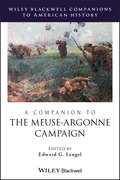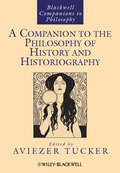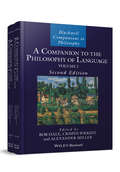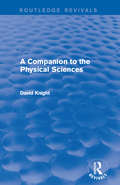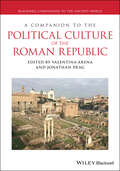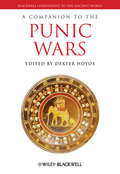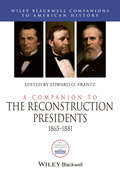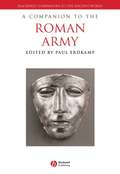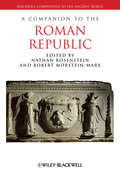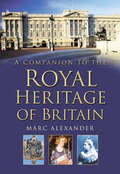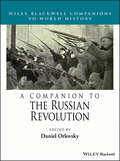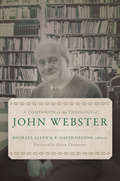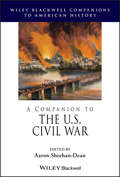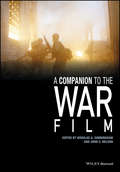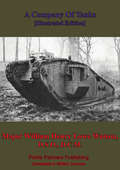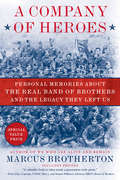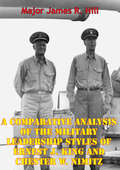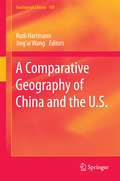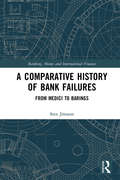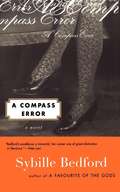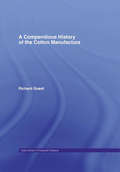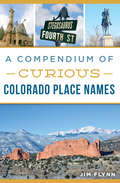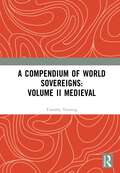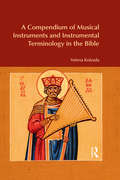- Table View
- List View
A Companion to the Meuse-Argonne Campaign (Wiley Blackwell Companions to American History)
by Edward G. LengelA Companion to the Meuse-Argonne Campaign explores the single largest and bloodiest battle in American military history, including its many controversies, in historiographical essays that reflect the current state of the field. Presents original essays on the French and German participation in ‒ and perspectives on ‒ this important event Makes use of original archival research from the United States, France, and Germany Contributors include WWI scholars from France, Germany, the United States, and the United Kingdom Essays examine the military, social, and political consequences of the Meuse-Argonne and points the way for future scholarship in this area
A Companion to the Philosophy of History and Historiography (Blackwell Companions to Philosophy #107)
by Aviezer TuckerThe fifty entries in this Companion cover the main issues in the philosophies of historiography and history, including natural history and the practices of historians. Written by an international and multi-disciplinary group of experts A cutting-edge updated picture of current research in the field Part of the renowned Blackwell Companions series
A Companion to the Philosophy of Language (Blackwell Companions to Philosophy #1)
by Alexander Miller Bob Hale Crispin Wright“Providing up-to-date, in-depth coverage of the central question, and written and edited by some of the foremost practitioners in the field, this timely new edition will no doubt be a go-to reference for anyone with a serious interest in the philosophy of language.” Kathrin Glüer-Pagin, Stockholm University Now published in two volumes, the second edition of the best-selling Companion to the Philosophy of Language provides a complete survey of contemporary philosophy of language. The Companion has been greatly extended and now includes a monumental 17 new essays – with topics chosen by the editors, who curated suggestions from current contributors – and almost all of the 25 original chapters have been updated to take account of recent developments in the field. In addition to providing a synoptic view of the key issues, figures, concepts, and debates, each essay introduces new and original contributions to ongoing debates, as well as addressing a number of new areas of interest, including two-dimensional semantics, modality and epistemic modals, and semantic relationism. The extended “state-of-the-art” chapter format allows the authors, all of whom are internationally eminent scholars in the field, to incorporate original research to a far greater degree than competitor volumes. Unrivaled in scope, this volume represents the best contemporary critical thinking relating to the philosophy of language.
A Companion to the Physical Sciences
by David KnightFirst published in 1989, this dictionary of the whole field of the physical sciences is an invaluable guide through the changing terminology and practices of scientific research. Arranged alphabetically, it traces how the meaning of scientific terms have changed over time. It covers a wide range of topics including voyages, observations, magnetism and pendulums, and central subjects such as atom, valency and energy. There are also entries on more abstract terms such as hypothesis, theory, induction, deduction, falsification and paradigm, emphasizing that while science is more than ‘organized common sense’ it is not completely different from other activities. Science’s lack of innocence is also recognized in headings like pollution and weapons. This book will be a useful resource to students interested in the history of science.
A Companion to the Political Culture of the Roman Republic (Blackwell Companions to the Ancient World)
by Andrew StilesAn insightful and original exploration of Roman Republic politics In A Companion to the Political Culture of the Roman Republic, editors Valentina Arena and Jonathan Prag deliver an incisive and original collection of forty contributions from leading academics representing various intellectual and academic traditions. The collected works represent some of the best scholarship in recent decades and adopt a variety of approaches, each of which confronts major problems in the field and contributes to ongoing research. The book represents a new, updated, and comprehensive view of the political world of Republican Rome and some of the included essays are available in English for the first time. Divided into six parts, the discussions consider the institutionalized loci, political actors, and values, rituals, and discourse that characterized Republican Rome. The Companion also offers several case studies and sections on the history of the interpretation of political life in the Roman Republic. Key features include: A thorough introduction to the Roman political world as seen through the wider lenses of Roman political culture Comprehensive explorations of the fundamental components of Roman political culture, including ideas and values, civic and religious rituals, myths, and communicative strategies Practical discussions of Roman Republic institutions, both with reference to their formal rules and prescriptions, and as patterns of social organization In depth examinations of the ‘afterlife’ of the Roman Republic, both in ancient authors and in early modern and modern times Perfect for students of all levels of the ancient world, A Companion to the Political Culture of the Roman Republic will also earn a place in the libraries of scholars and students of politics, political history, and the history of ideas.
A Companion to the Punic Wars (Blackwell Companions To The Ancient World Ser. #134)
by Dexter HoyosA Companion to the Punic Wars offers a comprehensive new survey of the three wars fought between Rome and Carthage between 264 and 146 BC. Offers a broad survey of the Punic Wars from a variety of perspectives Features contributions from an outstanding cast of international scholars with unrivalled expertise Includes chapters on military and naval techniques, strategies, logistics, and Hannibal as a charismatic general and leader Gives balanced coverage of both Carthage and Rome
A Companion to the Reconstruction Presidents, 1865 - 1881 (Wiley Blackwell Companions to American History)
by Edward O. FrantzA Companion to Reconstruction Presidents presents a series of original essays that explore a variety of important issues, themes, and debates associated with the presidencies of Andrew Johnson, Ulysses S. Grant, and Rutherford B. Hayes. Represents the first comprehensive look at the presidencies of Johnson, Grant, and Hayes in one volume Features contributions from top historians and presidential scholars Approaches the study of these presidents from a historiographical perspective Key topics include each president’s political career; foreign policy; domestic policy; military history; and social context of their terms in office
A Companion to the Roman Army (Blackwell Companions to the Ancient World #25)
by Paul ErdkampThis companion provides an extensive account of the Roman army, exploring its role in Roman politics and society as well as the reasons for its effectiveness as a fighting force. An extensive account of the Roman army, from its beginnings to its transformation in the later Roman Empire Examines the army as a military machine – its recruitment, training, organization, tactics and weaponry Explores the relationship of the army to Roman politics, economics and society more broadly Considers the geography and climate of the lands in which the Romans fought Each chapter is written by a leading expert in a particular subfield and takes account of the latest scholarly and archaeological research in that area
A Companion to the Roman Republic (Blackwell Companions to the Ancient World #135)
by Nathan Rosenstein Robert Morstein-MarxThis Companion provides an authoritative and up-to-date overview of Roman Republican history as it is currently practiced. Highlights recent developments, including archaeological discoveries, fresh approaches to textual sources, and the opening up of new areas of historical study Retains the drama of the Republic’s rise and fall Emphasizes not just the evidence of texts and physical remains, but also the models and assumptions that scholars bring to these artefacts Looks at the role played by the physical geography and environment of Italy Offers a compact but detailed narrative of military and political developments from the birth of the Roman Republic through to the death of Julius Caesar Discusses current controversies in the field
A Companion to the Royal Heritage of Britain
by Marc AlexanderMore than a biography of kings and queens, this title is an encyclopaedic work on every aspect of monarchy in Britain from semi-legendary times to the present day. It provides a reference for discovering more about individual monarchs and the huge legacy of myths, traditions and practices which has grown up around the institution of the monarchy.
A Companion to the Russian Revolution (Wiley Blackwell Companions to World History)
by Daniel OrlovskyA compendium of original essays and contemporary viewpoints on the 1917 Revolution The Russian revolution of 1917 reverberated throughout an empire that covered one-sixth of the world. It altered the geo-political landscape of not only Eurasia, but of the entire globe. The impact of this immense event is still felt in the present day. The historiography of the last two decades has challenged conceptions of the 1917 revolution as a monolithic entity— the causes and meanings of revolution are many, as is reflected in contemporary scholarship on the subject. A Companion to the Russian Revolution offers more than thirty original essays, written by a team of respected scholars and historians of 20th century Russian history. Presenting a wide range of contemporary perspectives, the Companion discusses topics including the dynamics of violence in war and revolution, Russian political parties, the transformation of the Orthodox church, Bolshevism, Liberalism, and more. Although primarily focused on 1917 itself, and the singular Revolutionary experience in that year, this book also explores time-periods such as the First Russian Revolution, early Soviet government, the Civil War period, and even into the 1920’s. Presents a wide range of original essays that discuss Brings together in-depth coverage of political history, party history, cultural history, and new social approaches Explores the long-range causes, influence on early Soviet culture, and global after-life of the Russian Revolution Offers broadly-conceived, contemporary views of the revolution largely based on the author’s original research Links Russian revolutions to Russian Civil Wars as concepts A Companion to the Russian Revolution is an important addition to modern scholarship on the subject, and a valuable resource for those interested in Russian, Late Imperial, or Soviet history as well as anyone interested in Revolution as a global phenomenon.
A Companion to the Theology of John Webster
by Michael Allen and R. David Nelson, editorsAn overview and analysis of John Webster&’s seminal contributions to Christian theology At the time of his death, John Webster was widely hailed as one of the leading Christian theologians in the world. Over the course of three decades, he produced groundbreaking studies on the theologies of Eberhard Jüngel and Karl Barth and, especially since the turn of the millennium, numerous books and essays on various themes in Christian dogmatics. He then intended to write an encyclopedic systematic theology—a project he was unable to complete. No substitute is possible for that lost opus, but the contributors offer this volume as an homage to Webster and an aid to those who want to learn from him. A Companion to the Theology of John Webster begins with an introductory section on Webster&’s theological development, then continues into an extensive overview of Webster&’s contributions to contemporary discussions of particular doctrines. An epilogue suggests how Webster&’s theology might have unfolded had he lived longer and imagines the continuing influence of his work on the enterprise of Christian dogmatics. Readers hoping to understand the legacy of this great theologian, and also those eager for fresh insights into the present state and future trajectories of contemporary Protestantism, will find much to offer here.
A Companion to the U.S. Civil War (Wiley Blackwell Companions to American History)
by Aaron Sheehan-DeanA Companion to the U.S. Civil War presents a comprehensive historiographical collection of essays covering all major military, political, social, and economic aspects of the American Civil War (1861-1865). Represents the most comprehensive coverage available relating to all aspects of the U.S. Civil War Features contributions from dozens of experts in Civil War scholarship Covers major campaigns and battles, and military and political figures, as well as non-military aspects of the conflict such as gender, emancipation, literature, ethnicity, slavery, and memory
A Companion to the War Film
by John C. Nelson Douglas A. CunninghamA Companion to the War Film contains 27 original essays that examine all aspects of the genre, from the traditional war film, to the new global nature of conflicts, and the diverse formats that war stories assume in today's digital culture. Includes new works from experienced and emerging scholars that expand the scope of the genre by applying fresh theoretical approaches and archival resources to the study of the war film Moves beyond the limited confines of "the combat film" to cover home-front films, international and foreign language films, and a range of conflicts and time periods Addresses complex questions of gender, race, forced internment, international terrorism, and war protest in films such as Full Metal Jacket, Good Kill, Grace is Gone, Gran Torino, The Messenger, Snow Falling on Cedars, So Proudly We Hail, Tae Guk Gi: The Brotherhood of War, Tender Comrade, and Zero Dark Thirty Provides a nuanced vision of war film that brings the genre firmly into the 21st Century and points the way for exciting future scholarship
A Company Of Tanks [Illustrated Edition]
by Major William Henry Lowe Watson, D.S.O., D.C.M."Steel, mud, blood and courage on the Western FrontThis is a fine book because it is a superb first hand eye-witness account of British Tanks in action throughout the First World War. Without much preamble Watson launches the reader, in company with the author's brother officers, men and machines into the heart of the field of conflict on the 11th Corps forward line on the Western Front in the Autumn and Winter of 1916. From that point to the end of the book and the war itself the narrative takes us inexorably into the dark heart of war the tankers knew. Battles and battlefield experiences in their various phases (sometimes the book includes descriptions as expansive as three chapters each) are covered in engrossing detail. We join the author and the men we come to know as personalities, at First and Second Bullecourt, in much detail at Third Ypres and Cambrai before Amiens, the breaking of the Hindenburg Line and Second Le Cateau. This is a primary source work within a finite resource and as such is beyond value. Nevertheless, it is also a highly absorbing read to be relished by students of the period-professional and amateur alike. Available in soft cover and hard back with dust jacket for collectors."-Leonaur Print VersionAuthor -- Major William Henry Lowe Watson, D.S.O., D.C.M. (1891-1931)Text taken, whole and complete, from the edition published in Edinburgh; William Blackwood, 1920.Original Page Count - vii and 296 pagesMaps -- 8 sketch maps.
A Company of Heroes: Personal Memories about the Real Band of Brothers and the Legacy They Left Us
by Marcus BrothertonTHE "MUST-READ"* BOOK THAT INSPIRED THE EXTRAORDINARY DOCUMENTARY FOR PUBLIC TELEVISION After the Band of Brothers went home, they never forgot the lessons of war... After chronicling the personal stories of the Band of Brothers in We Who Are Alive and Remain, author Marcus Brotherton presents a collection of remembrances from the families of the soldiers of Easy Company--and how their wartime experiences shaped their lives off the battlefield. A Company of Heroes is an intimate, revealing portrait of the lives of the men who fought for our freedom during some of the darkest days the world has ever known--men who returned home with a newfound wisdom and honor that they passed onto their families, and that continue to inspire new generations of Americans. *Jake Powers, Official E/506th Historian
A Company of Swans
by Eva IbbotsonFor 19-year-old Harriet Morton, life in 1912 Cambridge is dull. Her stuffy father and her oppressive aunt Louisa allow her only one outlet: ballet. When a Russian ballet master comes to class searching for dancers to fill the corps of his ballet company before their South American tour, Harriet's world changes.
A Comparative Analysis Of The Military Leadership Styles Of Ernest J. King And Chester W. Nimitz
by Major James R. HillIn a constantly changing world threatened by the likelihood of terrorist acts, the American people need military leaders who clearly demonstrate an understanding of American core values, and who are both competent and morally focused. In order to produce military leaders who meet these qualifications and who can successfully meet the future challenges America faces, it is important to develop and refine those leaders early and help them understand how to create and refine a successful leadership style. The process of developing leadership styles, however, is not easy and it requires a prodigious amount of determination, time, and planning from prospective future leaders. It also requires military training institutions to align their curriculums to promote leadership, as well as, to provide guidance and mentoring in order to help develop these future leaders.One way to help develop leaders is to provide examples of both successful and flawed military leadership styles. There are many cases of each in American history. In particular, World War II leaders Admirals Ernest J. King and Chester W. Nimitz provide contrasting examples of naval leadership. An examination of the leadership styles of these two naval officers provides useful examples which future leaders can consider when reflecting on their own leadership styles. After careful review, it soon becomes evident that the leadership style of Nimitz closely aligned with the leadership styles of Generals George C. Marshall and Dwight D. Eisenhower, two World War II leaders I closely examined in my previous Master's thesis. In addition, it also becomes evident that King was a diametrically different leader from these three leaders. He provides an example of a leader who was cold, harsh, and morally bankrupt. As result, reviewing the leadership styles of these World War II leaders will benefit future leaders as well as those they lead.
A Comparative Geography of China and the U.S. (GeoJournal Library #109)
by Rudi Hartmann Jing'Ai Wang Tao YeThe book is the outcome of a unique venture: a team of Chinese geographers and a team of American geographers collaborated on a new Comparative Geography of China and the United States. The book meets a high demand for comparative information about China and the United States, as the home of the two leading economies in a globalizing world. Comparisons of the two countries include the similarities and differences in their physical environments and natural hazards, the growth and changing spatial distribution of population and ethnic groups in China and the U. S. , traditions and contemporary regional expressions of agriculture and food production as well as the rapidly changing urban and industrial patterns in both countries. The book also highlights the two countries' interconnectedness, in trade and in the exchange of cultural, social, scientific & technological information. The volume serves as a major resource in geographic education as it contributes to a better and more comprehensive understanding of the formation and development of the two countries' basic geographical patterns and processes.
A Comparative History of Bank Failures: From Medici to Barings (Banking, Money and International Finance)
by Sten JonssonStarting with Medici and Fugger and ending with Barings and Royal Bank of Scotland under neo-liberal de-regulation, the author gives an account of how a number of banks failed over a 500 year-period. The author offers an explanation of the leading ideas about the world and good society at the time, and summarizes this narrative using Streeck & Schmitter’s three bases for regulation of society: Community (spontaneous solidarity), State (hierarchical control), and Market (dispersed competition). <P><P>The bank failures are presented in the context of social philosophies of the day (scholasticism, mercantilism, neo-liberalism, and libertarianism), and the changing business practices (Bills of Exchange, rents and financial instruments of various kinds). The dominating explanation of financial crises has been market-related. Here, the author argues that managerial failures are an important contributor. He demonstrates the failure of management to act on early signals such as existential risk, strategic stress syndrome, and lack of proper oversight by top management. The author encourages a return to ethical principles for banks, suggesting that his ethical aspect should be at the core of the credit process of banks in the future. <P><P>With its interdisciplinary approach, this book will be an important contribution to the discussion surrounding bank failures. It will interest any scholar looking at the origins of financial crises and will be particularly useful for post-graduate students of economic and financial history, banking, finance and accounting.
A Compass Error
by Sybille BedfordFirst published in 1968. In this sequel to The Favourite of the Gods, seventeen-year-old Flavia, on her own in the south of France in the late 1930s, lives with the confidence and ardor of youth. She knows her destiny-it lies at Oxford, where she will begin a great career of public service. But this view of herself is at odds with reality; it springs from ideas she has of her idolized English father and of her blessed Italian mother, Constanza. Only when she is caught up in an intrigue that is to determine the fate of those she most loves does she begins to discover her own true nature-even as she loses the bearings of her moral compass.
A Compendious History of Cotton Manufacture: With A Disproval Of The Claim Of Sir Richard Arkwright To The Invention Of Its Ingenious Machinery -
by Richard GuestFirst Published in 1968. Routledge is an imprint of Taylor & Francis, an informa company.
A Compendium of Curious Colorado Place Names (History & Guide)
by Jim FlynnThe origins of Colorado place names offer insightful glimpses into the state's formative years. Emanuel Saltiel named his new community along the Arkansas River Cotopaxi, after a volcano in Ecuador. Rifle Creek and the town of Rifle earned their names thanks to a rifle left behind along the banks of the creek. Optimistic miners mistakenly believed Tarryall had an abundance of gold and thus named it as a place where prospectors could mine and tarry. And despite attempts by government officials to rename a small community along the I-70 corridor in western Colorado, locals refused to call it anything other than No Name. Learn these stories and more as author Jim Flynn unravels the intriguing origins of Centennial State place names.
A Compendium of Medieval World Sovereigns
by Timothy VenningThe Compendium of World Sovereigns series contains three volumes: Ancient, Medieval, and Early Modern. These volumes provide students with easy-to-access ‘who’s who’ with details on the identities and dates, ages and wives, where known, of heads of government in any given state at any time within the framework of reference. The relevant original and secondary sources are also listed in a comprehensive bibliography. The text provides a clear reference guide for students to who was who and when they ruled in the dynasties and other ruler-lists for the Ancient, Medieval, and Early Modern worlds – primarily European and Middle Eastern but including available information on Africa and Asia and the pre-Columbian Americas. The trilogy accesses and interprets the original data plus any modern controversies and disputes over names and dating, reflecting on the shifts in and widening of focus in student and academic studies. Each volume contains league tables of rulers’ ‘records’, and an extensive bibliographical guide to the relevant personnel and dynasties, plus any controversies, so readers can consult these for extra details and know exactly where to go for which information. All relevant information is collected and provided as a one-stop-shop for students wishing to check the known information about a world Sovereign. The Medieval volume begins with the Byzantine Empire and moves through the Crusader States, the Islamic World, South and East Asia, Africa, the Mediterranean, and lastly Western and Eastern Europe. Compendium of World Sovereigns: Volume II Medieval provides students and scholars with the perfect reference guide to support their studies and to fact check dates, people, and places.
A Compendium of Musical Instruments and Instrumental Terminology in the Bible
by Yelena Kolyada'A Compendium of Musical Instruments and Instrumental Terminology in the Bible' draws on extensive historical research, comparative linguistic analysis and musical study to offer the first compilation of its kind. The volume examines the entire range of musical instruments in the Bible - stringed, wind and percussion - drawing on ancient and modern translations of the Bible and the works of rabbinic teachers, Church Fathers and medieval, renaissance and contemporary scholars. The book offers a historical survey of Hebrew instrumental music - its origins and links with neighbouring cultures, the role of instruments in the religious, social, public and private life of ancient Israel, and the system of musical education - and explores the understanding of Hebrew musical instruments in post-biblical times. This comprehensive volume will be invaluable to musicologists, archaeologists, theologians, historians, philologists and Bible translators, as well as general readers in the subject.
